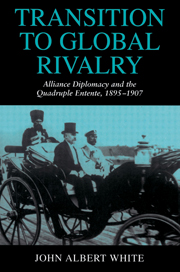Book contents
- Frontmatter
- Contents
- List of illustrations
- List of maps
- Preface
- Chronology
- List of abbreviations
- 1 Portents of conflict
- 2 The focus of hostility
- 3 The emergence of encirclement
- 4 Russia in political recession
- 5 The Algeciras factor
- 6 After Portsmouth and Algeciras
- 7 Imperial truce
- Appendices
- Bibliography
- Index
2 - The focus of hostility
Published online by Cambridge University Press: 04 August 2010
- Frontmatter
- Contents
- List of illustrations
- List of maps
- Preface
- Chronology
- List of abbreviations
- 1 Portents of conflict
- 2 The focus of hostility
- 3 The emergence of encirclement
- 4 Russia in political recession
- 5 The Algeciras factor
- 6 After Portsmouth and Algeciras
- 7 Imperial truce
- Appendices
- Bibliography
- Index
Summary
A global perspective
The worldwide rivalry of which Britain and Russia were a part had by 1903 converged in two principal regions, the Middle and Far East, neither offering the contenders a convenient theater of operations for settling their differences. In the Middle East there were three closely interrelated conflicts of which that between Britain and Russia was the most protracted and seemingly the least susceptible of solution. This deadlock, however, was ultimately broken by penetration into the region of Germany, the very nation whose foreign policy was based in part on the assumption that a continuation of an Anglo-Russian conflict was inevitable. Initially, both Britain and Russia tried to make an accommodation with Germany. Russia, however, found this extremely difficult since she was opposed to the very presence in this vital area of Germany as a competitor with such substantial interests and, in view of her own strategic objectives, found an accommodation virtually impossible.
Britain at first saw Germany as a potential ally against Russia but by 1903 she had found that the aims of the two nations were incompatible. In the end it was Britain and Russia which, confronted with this formidable competitor, were able to reconcile their differences. Before this happened, however, Britain and Japan had made common cause in the Far East against Russia and by the close of 1903 actual hostilities between Russia and Japan appeared to be imminent.
The most persistent of Britain's rivals were either along the maritime routes, in the contested colonial areas, or at or near the commercial centers. All of these conditions were characteristic of India, the centerpiece and principal focus of Anglo-Russian rivalry and of British interest in Asia.
- Type
- Chapter
- Information
- Transition to Global RivalryAlliance Diplomacy and the Quadruple Entente, 1895–1907, pp. 43 - 80Publisher: Cambridge University PressPrint publication year: 1995



